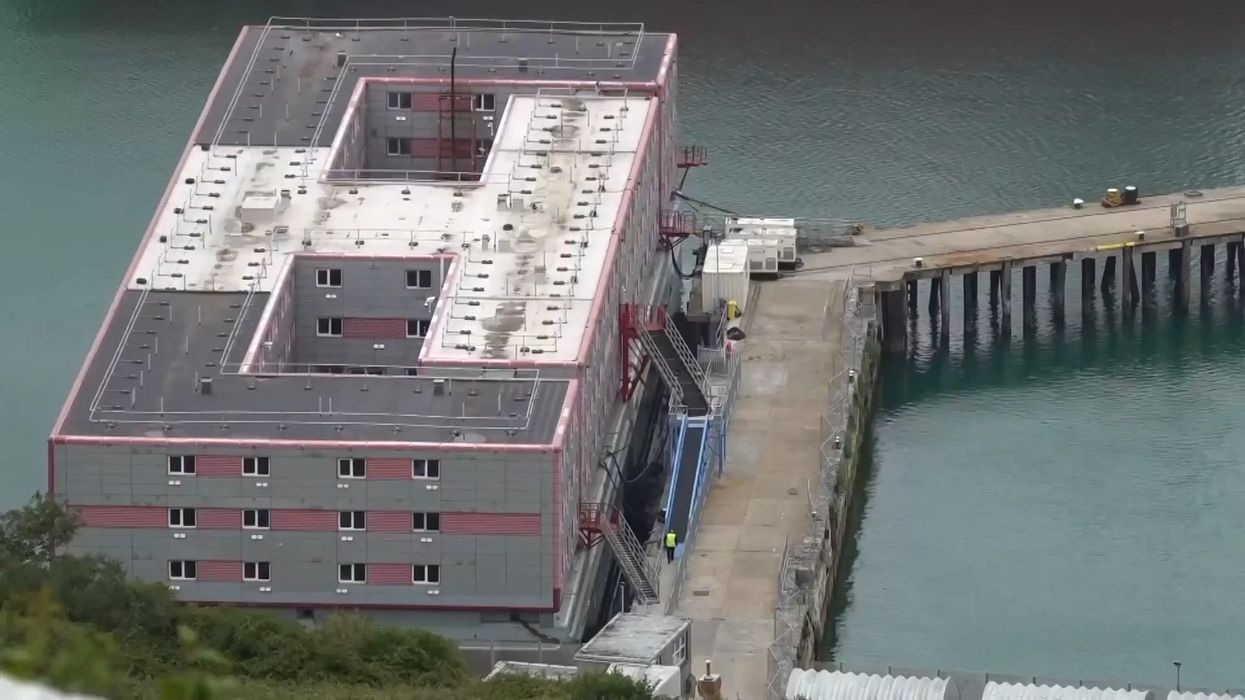Kate Plummer
Aug 09, 2023
People board Bibby Stockholm barge which will house up to 500 asylum …
content.jwplatform.com
This week, 15 asylum seekers boarded the Bibby Stockholm, a barge in Dorset that is being used to house those entering the UK.
The boat, ironically, is the flagship of the government's latest plan to "stop the boats" and deter dangerous Channel crossings by migrants.
Up to 500 men aged 18-65 will live on the vessel while they await the outcome of asylum applications.
However, it has been criticised by charities and human rights groups because of safety concerns and some asylum seekers have even refused to enter it.
Below, we explore everything we know about the barge and examine what life will be like for those living on it.
Sign up to our free Indy100 weekly newsletter
What is the Bibby Stockholm barge?
The Bibby Stockholm is a barge that was built in 1976. It was previously used to house homeless people and some asylum seekers in Germany and later the Netherlands before being used to house construction workers in Scotland.
In April 2023, the UK government announced plans to use it to house asylum seekers, with the barge moved to the Portland port in Dorset for an initial 18-month period.
This week, the first 15 asylum seekers entered the barge but 20 refused to get on. In response, the government said boarding the vessel was not a choice and said those who refuse will no longer receive government support.
What will life be like for those on board?

On board, there is 24/7 security in place and asylum seekers are issued with ID swipe cards and have to pass through airport-style security scans to get on and off.
There are 222 bedrooms, most of which have twin bunk beds, with cupboard space, a desk, en-suite bathroom, heating and windows.
There are also 20 larger rooms which would sleep four people and two rooms for six people.
The bedrooms all have televisions, which the operator was told to disconnect. However, as they were too costly to remove they can be still be used as monitors.
Residents will be encouraged to socialise or watch programmes and films in one of four communal TV rooms.
They can also learn English in a classroom and pray in a dedicated space. A small number of laptops are also available and there is Wi-Fi throughout the barge.
As for food, a sample menu provided to journalists included spaghetti with meatballs, roast turkey, Irish stew and beef pie. A selection of snacks will also be available 24 hours a day.
For exercise, people will be able to use a gym with treadmills, weights, rowing machines and exercise bikes.
They can also play team sports, including volleyball, basketball, netball and football in one of two outside courtyards.
Migrants will be free to leave on hourly buses to Weymouth and Portland, although they are encouraged to return by 23:00 each night.
What have those on the board said about it?
People on board have been interviewed about their experiences and some of them have expressed negative views about life on board the boat.
An Afghan asylum seeker told the BBC: "The sound of locks and security checks gives me the feeling of entering Alcatraz prison.
"My roommate panicked in the middle of the night and felt like he was drowning. There are people among us who have been given heavy drugs for depression by the doctor here."
He said he had been given a small room, and the dining hall had capacity for fewer than 150 people.
"Like a prison, it [the barge] has entrance and exit gates, and at some specific hours, we have to take a bus, and after driving a long distance, we go to a place where we can walk. We feel very bad," the man added.
Another man who boarded the vessel on Monday told the BBC he had a more positive experience.
He said he had eaten a "good" breakfast which included "eggs, cheese, jam and butter".
Another asylum seeker told The Sun that he was enjoying his time on board so far. He said: "It's OK, I like it."
Meanwhile, an Algerian told the newspaper: "It's good. It's normal. Food was good. Bed was good."
What have charities said about it?
Care4Calais is among the charities against the use of the Bibby Stockholm. Steve Smith, the charity’s CEO, said it was "inhumane".
He said: “Among our clients are people who are disabled, who have survived torture and modern slavery and who have had traumatic experiences at sea. To house any human being in a ‘quasi floating prison’ like the Bibby Stockholm is inhumane. To try and do so to this group of people is unbelievably cruel.”
Amnesty International UK similarly condemned using the barge to house asylum seekers. Steve Valdez-Symonds, the charity’s refugee and migrant rights director, said: “It seems there’s nothing this government won’t do to make people seeking asylum feel unwelcome and unsafe in this country.
“Reminiscent of the prison hulks from the Victorian era, the Bibby Stockholm is an utterly shameful way to house people who’ve fled terror, conflict and persecution. Housing people on a floating barge is likely to be re-traumatising and there should be major concerns about confining each person to living quarters the typical size of a car parking space.”
What has the government said about it?
The government has defended the barge, unsurprisingly. It said it is spending £6m per day housing more than 50,000 migrants in hotels and that the barge will be better value for British taxpayers than these hotels.
They have also said it will be more manageable for local communities.
Justice secretary Alex Chalk described the barge as "basically safe and decent" and said the policy was about "fairness to the British taxpayer" to find a cheaper alternative to "four star hotels".
After some people refused to board the barge, economic secretary to the Treasury, Andrew Griffiths, said that moving to the barge was "not a choice" and if people choose not to comply "they will be taken outside of the asylum support system".
And prime minister Rishi Sunak has said the accommodation will "help solve a serious problem", telling LBC last week: "This is an example of me doing something different that hasn’t been done before."
What are the latest migration figures?
More than 15,000 asylum seekers have arrived in the UK so far this year after crossing the Channel, official figures show.
On Friday and Saturday 339 people made the journey, taking the provisional total for 2023 to date to 15,071.
Have your say in our news democracy. Click the upvote icon at the top of the page to help raise this article through the indy100 rankings.
Top 100
The Conversation (0)













